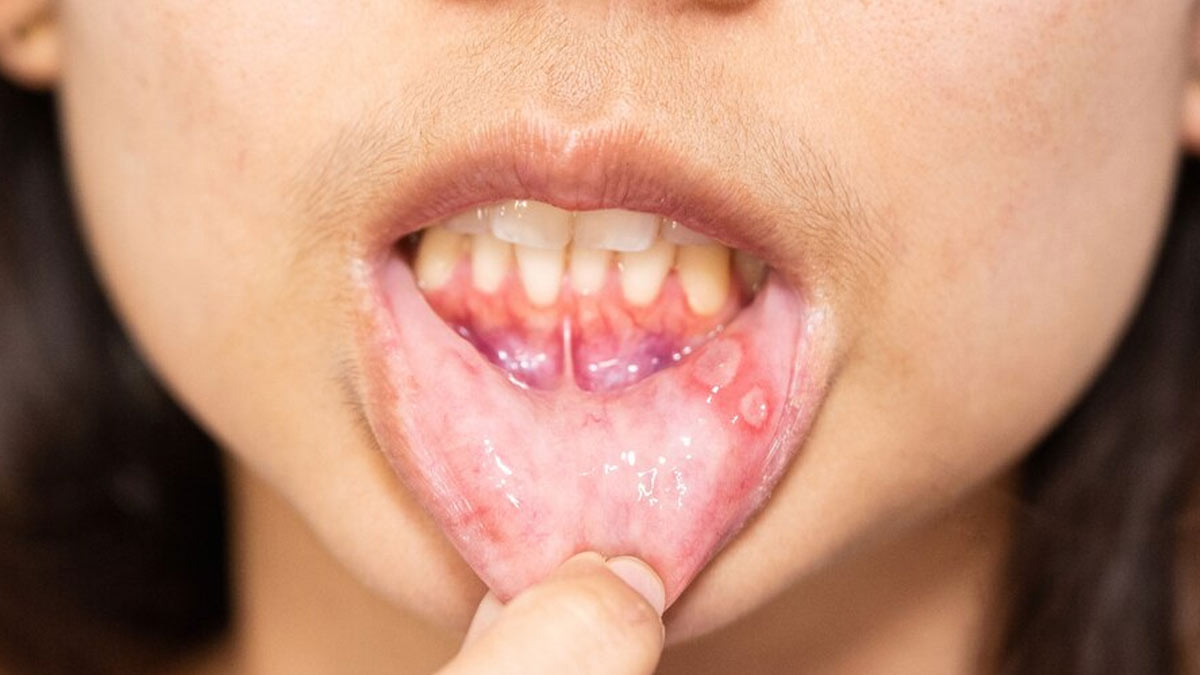
Mouth ulcers and fever blisters can affect your health in several ways. While the pain can be distressing, the impact on your food intake and the type of food you eat can be significantly influenced by it, affecting your overall wellness.
Table of Content:-
It is important to note that the two oral problems can have similar characteristics, making it difficult to differentiate between them. However, identifying which is which helps address the underlying cause more effectively. To help you do so, Dr Deepak Koul, Consultant Oral and Maxillofacial Surgeon, Manipal Hospital, Kharadi, Pune, sheds light on the distinguishing factors between the two.
Also Read: Useful Home Remedies To Get Rid Of Fever Blisters Or Cold Sores
What Causes Mouth Ulcers?

Dr Koul describes mouth ulcers, also known as canker sores, as tiny, painful lesions that form in the mouth or at the base of the gums.
They are often round or oval in shape with a white or yellow centre and a red border and can make eating, drinking, and conversing unpleasant, he adds.
According to the doctor, the primary cause of mouth ulcers can often be unknown, but several reasons can cause them. These include:
- Minor dental injuries
- Accidental cheek biting
- Rigorous teeth brushing
- Other factors include:
- Stress
- Hormonal fluctuations
- Certain meals, such as citrus or spicy foods
- Vitamin deficiencies, especially B12, zinc, folate, and iron
- Underlying health disorders, such as celiac or Crohn's disease
What Causes Fever Blisters?

On the other hand, fever blisters, also known as cold sores, are small, fluid-filled blisters that typically grow on or near the lips, shares Dr Koul, adding that the herpes simplex virus (HSV), particularly HSV-1, is the cause of such oral problems.
"Shared utensils or intimate physical contact can transmit the highly contagious cold-sore bacteria. Recurrent outbreaks can result from the virus staying dormant in the body following the original infection and being triggered by different things," the doctor explained, highlighting that stress, exhaustion, sickness, sun exposure, and hormone fluctuations can also be common contributing factors.
How To Differentiate Between Mouth Ulcers And Fever Blisters?
To differentiate between mouth ulcers and fever blisters, it is crucial to take certain factors into consideration, such as the location, appearance, and cause.
Dr Koul says, "Mouth ulcers are usually seen inside the mouth, on the inner cheeks, lips, tongue, or at the gum base. They resemble round or oval sores with a white or yellow core and a crimson border. On the other hand, cold sores are generally found outside the mouth, especially around the lips, but they can also appear on the face or within the nostril. They begin as tiny, fluid-filled blisters that later burst and crust over."
As opposed to mouth ulcers, cold sores can cause itching and tingling in the early stages, and even though cold sores can be uncomfortable and ugly, they generally go away on their own in a few days, notes Dr Koul.
Another important difference is the cause: mouth ulcers are not contagious and can be caused by a variety of circumstances, such as minor traumas, stress, or nutritional deficiencies. The herpes simplex virus causes cold sores, which are highly contagious and can be provoked by anxiety, sickness, or sun exposure.
Also Read: Mouth Ulcers: 7 Home Remedies To Treat Painful Sores
When Do You Need Medical Assistance?

Both mouth ulcers and cold sores can be uncomfortable and painful. However, most of these oral conditions do not require immediate medical attention.
Nonetheless, some circumstances can require the help of a doctor, advises Dr Koul.
"A doctor should be consulted if one has mouth ulcers that last longer than three weeks, repeat often, or are unusually wide and painful. These symptoms could be signs of an underlying medical disease. Similarly, cold sores generally go away on their own in two weeks, but one should see a doctor if they get really bad, spread to the eyes, or cause other symptoms like fever, difficulty swallowing, or swollen glands. Also, those with weakened immune systems need to see a doctor if they experience severe or recurrent episodes of either disease," he shares.
However, if the ulcers do not show signs of regression after around three weeks, a biopsy is warranted to rule out any other serious underlying cause, the doctor concludes.
Also watch this video
How we keep this article up to date:
We work with experts and keep a close eye on the latest in health and wellness. Whenever there is a new research or helpful information, we update our articles with accurate and useful advice.
Current Version